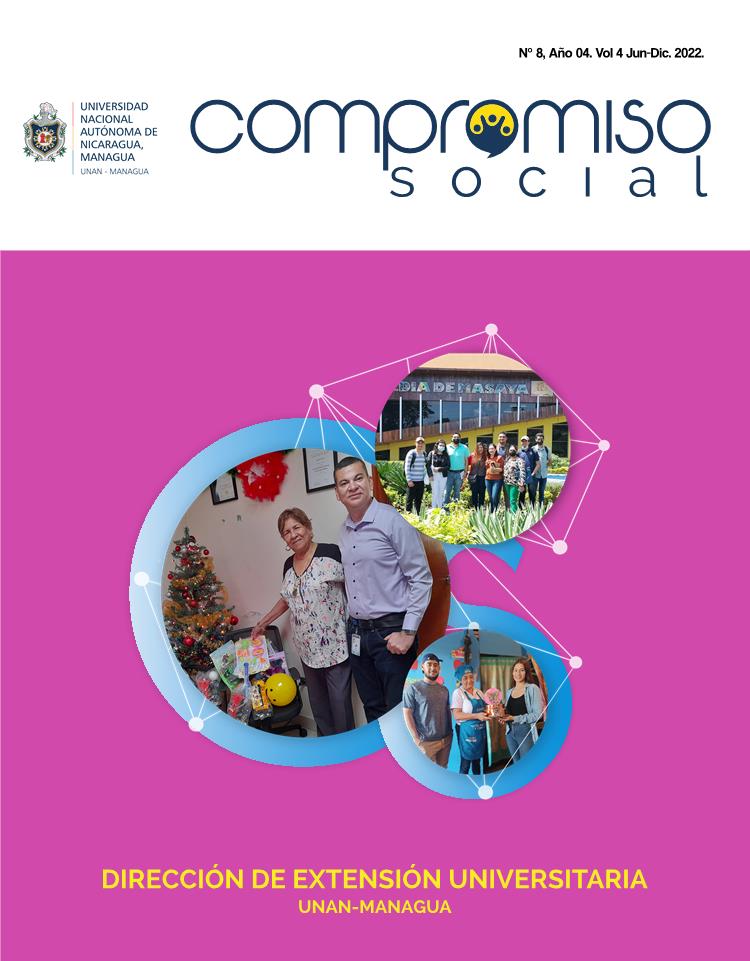Recognize the voice of communities to accompany and learn Challenges in the context of ETA - IOTA, Nicaragua
DOI:
https://doi.org/10.5377/recoso.v4i8.18617Keywords:
Interculturality, post-disaster actions, ETA, IOTA, good livingAbstract
This essay seeks to share some reflections arising in the practice of the author, who was part of an accompaniment process developed in the Caribbean of Nicaragua, in the post-disaster context due to the occurrence of the impact that the entry of 2 hurricanes meant in the year 2020. The purpose is to put out loud the need to document the actions that are sought in terms of psychosocial accompaniment, emotional recovery or accompaniment in critical situations as they have been called, mainly when they are developed in contexts of emergency and attention to disasters and even more when these occur in realities of cultural diversity that need to be revalued. Highlight then, the importance of rethinking the proposals, the conceptual categories packaged in the concept of help, investigate and propose based on observation and sensitive listening, actions that can effectively favor integrated accompaniments to the worldview of the peoples, adjusted to their needs, narratives and links with the environment, expressed in the relationships between people, families and communities, especially when events persist in cycles that come and go and call for learning and invoking hope to be reborn in harmony with everything.From the dialogue, based on the narrative of women, men, young people, students, workers and workers, history was woven to recover what was lived, to find the cultural, symbolic keys that favored looking at each other, crying and strengthening ourselves in the common and the diverse, in community.This writing is dedicated to them and to them, brothers and sisters, thanking them for the opportunity to learn in the privilege that meant the possibility of accompanying the hope of collective reconstruction for good living
Downloads
References
Cox Molina A. (2016). Espiritualidad y filosofía indígena. URACCAN. Nicaragua. Recuperado de: https://es.scribd.com/document/492039276/Perfil-Demografico-2020-PWsyOuB
Decreto Ley No. 04-2022. Política Nacional de Cambio Climático. Publicado en La Gaceta Diario Oficial No. 35 de 22 de febrero de 2022.
INIDE (2021), Anuario Estadístico 2019, Sitio www.inide.gob.ni• J. Soriano (2005). Los procesos de la relación de ayuda. Editorial Desclee de Brouwer, S. A. España.
Jara O. (2018). La sistematización de experiencias: práctica y teoría para otros mundos posibles. Primera Edición Colombia en https://repository.cinde.org.co/bitstream/handle/20.500.11907/2121/Libro%20sistematizacio%CC%81n%20Cinde-Web.pdf?sequence=1&isAllowed=y
León T. M (s/f). El “buen vivir”: objetivo y camino para otro modelo. En https://base.socioeco.org/docs/el_buen_vivir_objetivo_y_camino_para_otro_modelo.pdf
Ley No. 162 de 1993. Uso oficial de las lenguas de las comunidades de la Costa Atlántica de Nicaragua. Publicado en La Gaceta, Diario Oficial No. 132 de 15 de julio de 1996.
Ley No. 337. Ley creadora del Sistema Nacional para la Prevención, Mitigación y Atención de Desastres,publicada en la Gaceta, Diario Oficial No. 70 del 7 de abril del 2000.
Murillo J. (2012). Historia y Memoria de los sobrevivientes del deslave del Volcán Casitas. Nicaragua.
OCHA (2020) Plan de Acción Nicaragua en https://reliefweb.int/report/nicaragua/nicaragua-2020-plan-de-acci-n-huracanes-eta-e-iota-noviembre-2020
Ortiz de Arri El País (1999, 1 de marzo). Felicita Zeledón alcaldesa de Posoltega (Nicaragua) “Tres meses después del “Mitch”, nos llegan muy pocas ayudas”. El País. https://elpais.com/diario/1999/03/02/paisvasco/920407227_850215.html
Pro Nicaragua (2020), Perfil Demográfico 2020, PWsyOuB, consultado 6 de agosto 2022 en SINAPRED, (2022), Aprendamos de prevención. Sitio en https://www.sinapred.gob.ni/index.php/aprendamos-de-prevencion
Downloads
Published
How to Cite
Issue
Section
License
Copyright (c) 2022 Universidad Nacional Autónoma de Nicaragua, Managua(UNAN-Managua)

This work is licensed under a Creative Commons Attribution-NonCommercial-ShareAlike 4.0 International License.




